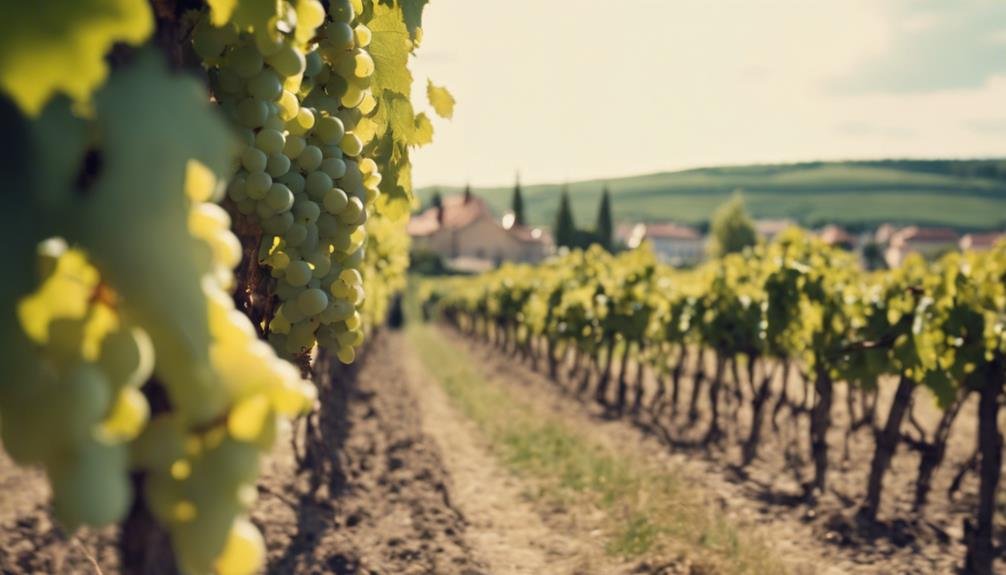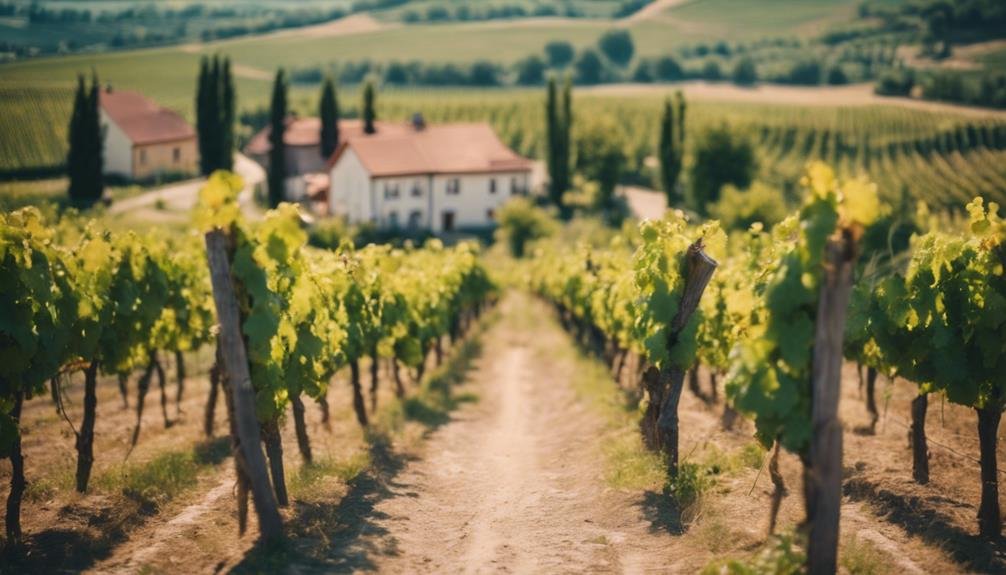In Hungary, a blend of tradition and modern techniques is revolutionizing winemaking. The innovative approach encompasses grape cultivation, fermentation, and aging methods, attracting enthusiasts worldwide. Eger exemplifies this fusion through precision viticulture and modern oak barrel technology. Tokaj balances tradition with innovation using indigenous grapes and sustainable practices. Villány focuses on quality, crafting Bordeaux-style blends with a modern touch. Nagy Somló sustains authenticity by blending historical grape varieties with modern viticulture. This harmonious mix of old and new is reshaping Hungarian wines, offering unique flavors and experiences for wine lovers everywhere.
Hungarian Wine Resurgence Through Innovation
Amidst a blend of traditional winemaking practices and modern techniques, Hungarian wines are experiencing a notable renaissance, marking a resurgence through innovation in the industry.
This historical revival is driven by innovative winemaking techniques that combine the rich heritage of Hungarian viticulture with contemporary practices. Winemakers in Hungary have been embracing new approaches to grape cultivation, fermentation, and aging, resulting in wines that capture the essence of the region while appealing to modern palates.
By experimenting with different grape varieties, fermentation methods, and aging processes, Hungarian winemakers are creating unique and exciting wines that are gaining recognition on the international stage.
This blend of tradition and innovation is propelling Hungarian wines to new heights, attracting enthusiasts and connoisseurs alike.
Eger: Blending Tradition With Technology
In Eger, the fusion of traditional winemaking practices with modern technological advancements has resulted in a distinctive and innovative approach to wine production. This blending of heritage with innovation has propelled Eger's wines to new heights of quality and recognition.
Here are four ways in which Eger combines tradition with technology:
- Precision Viticulture: Eger vineyards utilize cutting-edge technology for precise irrigation and nutrient management, optimizing grape quality.
- Temperature-Controlled Fermentation: Traditional winemaking techniques are enhanced by modern cooling systems, ensuring consistent fermentation temperatures for better flavor extraction.
- Barrel Aging Innovation: Eger wineries employ modern oak barrel technology, combining traditional wood aging with controlled oxygen exposure for balanced and complex wines.
- Winery Design: Modern winery facilities in Eger integrate energy-efficient practices and state-of-the-art equipment, enhancing production efficiency while respecting traditional winemaking values.
Tokaj: Preserving Heritage, Embracing Innovation

Preserving the rich heritage of Tokaj's winemaking traditions while embracing innovative techniques has been instrumental in elevating the region's reputation and quality of wines. Balancing tradition and innovation in winemaking is a delicate art in Tokaj, where the roots of winemaking run deep. This region, known for its iconic Tokaji sweet wines and dry Furmint varieties, has found a way to honor its past while moving forward with modern practices. By preserving heritage and embracing innovation in Tokaj, winemakers can create exceptional wines that reflect the unique terroir and history of the region.
| Preserving Heritage | Embracing Innovation |
|---|---|
| Respect for traditional winemaking methods | Introduction of modern viticultural techniques |
| Focus on indigenous grape varieties | Adoption of sustainable farming practices |
| Aging wines in traditional underground cellars | Experimentation with new oak aging methods |
| Hand-harvesting grapes for quality control | Utilization of temperature-controlled fermentation |
Villány: Redefining Quality and Craftsmanship
With a focus on precision and craftsmanship, Villány is setting new standards in quality winemaking within the Hungarian wine industry. Villány's commitment to quality craftsmanship and terroir expression is evident in several key aspects:
- Innovative Winemaking Techniques: Villány winemakers are embracing modern technologies while respecting traditional methods, allowing for the production of wines that showcase both innovation and authenticity.
- Emphasis on Terroir Expression: The unique chalky limestone and loess soils of Villány play an essential role in shaping the flavor profile of the wines, highlighting the region's distinct terroir characteristics.
- Focus on Full-Bodied Reds: Villány is renowned for its full-bodied red wines, particularly Cabernet Franc and Merlot, which reflect the region's dedication to producing bold and rich Bordeaux-style blends.
- Commitment to Quality Production: Villány's wine culture places a strong emphasis on meticulous vineyard practices and careful winemaking techniques, ensuring the consistent delivery of high-quality wines that capture the essence of the region.
Nagy Somló: Sustaining Authenticity in Modernity

Maintaining its traditional roots while embracing modern advancements, Nagy Somló embodies a harmonious blend of authenticity and innovation in its winemaking practices. With a focus on sustainable viticulture, Nagy Somló showcases a commitment to preserving the environment while producing high-quality wines.
This small wine region in western Hungary is known for its historical grape varieties, such as Juhfark and Furmint, which contribute to the unique minerality and acidity found in its wines. By prioritizing indigenous grape varieties and terroir-driven winemaking, Nagy Somló stays true to its heritage while adapting to contemporary techniques.
The result is a fine balance between tradition and modernity, appealing to wine enthusiasts seeking genuine and distinctive flavors in their wine choices.
Frequently Asked Questions
How Has Climate Change Affected Hungarian Wine Production?
Climate change has impacted Hungarian wine production by altering growing conditions. Winemakers have adapted through technological advancements and adjustments in grape varietals. These changes aim to mitigate climate challenges, ensuring continued quality and sustainability in wine production.
What Are the Sustainability Practices Adopted by Hungarian Wineries?
Hungarian wineries embrace sustainable practices such as organic farming and biodynamic methods, akin to nurturing a vineyard as a gardener tends to a prized orchard. By harmonizing with nature, they guarantee quality wines for generations.
Are Hungarian Winemakers Experimenting With Natural Wine Production?
Hungarian winemakers are increasingly exploring natural fermentation and embracing biodynamic farming practices. This shift towards sustainability and minimal intervention in the winemaking process reflects a global trend towards more organic and environmentally friendly wine production methods.
How Are Hungarian Winemakers Preserving Ancient Winemaking Techniques?
Hungarian winemakers are preserving ancient winemaking techniques by blending them with modern technology. They honor tradition through practices like hand-harvesting and oak barrel aging, while embracing innovation with advancements in vineyard management and fermentation processes.
What Role Does Hungarian Wine Tourism Play in the Industrys Revival?
Hungarian wine tourism is pivotal in the industry's revival. Economic impact is substantial, fostering growth in vineyards and wineries. Cultural exchange thrives, showcasing Hungary's rich winemaking history. Marketing strategies enhance customer engagement, driving interest and appreciation globally.
Conclusion
To sum up, the revitalization of Hungarian wine through the fusion of tradition and modern techniques has ushered in a new era of excellence in the country's winemaking industry.
By preserving heritage while embracing innovation, Hungarian winemakers are crafting exceptional vintages that highlight the unique terroir and character of each region.
This harmonious blend of old-world craftsmanship and contemporary methods guarantees that Hungary's wine legacy continues to flourish, enchanting the palate of wine enthusiasts worldwide.